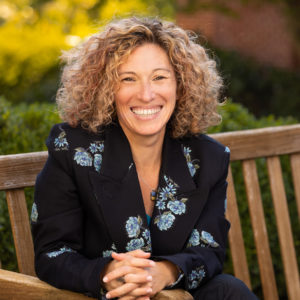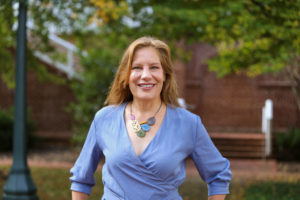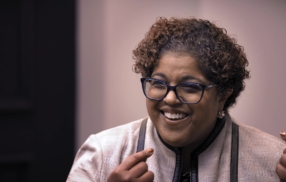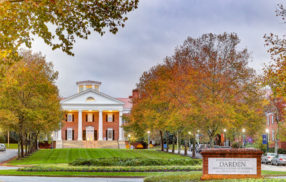
Darden’s Signature Approach Evolves as MBA Industry Shifts
By Dave Hendrick
Since immigrating to the United States during the Guatemalan Civil War, Marleny De León (Class of 2024) has never stopped studying and learning. After an undergraduate career in Arizona that sparked her interest in ethnographic studies, she moved on to graduate at the top of her class at Stanford with a master’s degree in Latin American studies, then completed a Fulbright-funded research project exploring deaf communities in Italy.
Interested in growing her quantitative skills, De León followed Stanford with a master’s of public policy in education with an emphasis in quantitative research methods at Vanderbilt, from which she graduated in three semesters. A network of entrepreneurs and business leaders in Europe helped put an MBA on her radar, and De León realized a solid foundation in finance and capital markets would best help her accomplish her future goals.
Spurning offers of entrepreneurial-focused, one-year master’s degrees at Harvard and Wharton, De León accepted a Darden Breakthrough Scholarship, awarded by the Darden School Foundation to elite women and under- represented minority students interested in a career in asset management. By fall, she was settling into the pace and workload of a 21-month Full-Time MBA and already looking ahead to a summer internship in a field she had not previously considered: investment banking.
“It was a hard decision to make,” said De León of opting for a traditional MBA over the many alternatives in the marketplace. “Ultimately, it was the knowledge that I was going to leave this two-year period with the confidence to walk the walk — it’s more than just a degree.”
The business of the MBA is cyclical like any other, but Darden depends on a critical mass of top talent with De León’s mindset to attract future leaders to its bread-and-butter offering.
Surveying the Landscape
Right now, the footing at Darden and its elite peers remains strong, even as the ground beneath the broader industry continues to shift. The return on investment of the Darden MBA remains rock-solid, with the most recent Darden graduating class earning a record-setting base mean salary of $157,090 (excluding bonuses) and 96 percent employed within three months of graduation. The upward momentum comes as Darden students benefit from a growing pool of scholarship support and financial aid.
Scholarship and support programs such as Future Year Scholars, AccessDarden, Impact Fellows and Breakthrough Scholars are helping widen the pool of prospective applicants.
Despite the clear ROI, after two years of double- digit application growth to the Full-Time MBA applications for the Darden Class of 2024 were essentially flat year over year, with roughly 3,000 applicants leading to 348 enrolled students. Even so, Darden beat the trend among top MBA programs, many of which reported steep application declines from the boom years at the height of the COVID-19 pandemic. An October The Wall Street Journal headline summed up the dive in applications: “The Hot Job Market Is a Problem for Harvard, Wharton, Other Top MBA Programs.”
A 2022 student survey from the Graduate Management Admissions Council (GMAC) offers a window into applicant interest. Full-time, in-person MBA programs remain the most popular program format, drawing the interest of 40 percent of prospective students. While interest in strictly online programs remains flat, interest in in-per- son and online hybrid approaches has increased significantly.
Darden’s growth in the Executive MBA, Part-Time MBA and Master of Science in business analytics (MSBA) in the Washington, D.C., area serves as a testament. Roughly one-fifth of GMAC survey respondents now express a preference for hybrid program delivery, up from 14 percent in the previous survey.
There are also proliferating options for graduate business degrees available to today’s students, from online and one-year MBAs to corporate programs to a mushrooming group of specialized master’s degrees.
Long-time business education chronicler John Byrne, publisher of the MBA news website Poets & Quants, recently described the market as “uncertain,” given lingering impacts from the pandemic and a broader economy impacted by the cross-currents of a hot job market but a growing threat of recession.
Speaking shortly after the start of the academic year, Byrne said top trends included a continued decline in domestic applicants (a phenomenon he linked in part to a strong U.S. jobs market), the explosion in online degrees and the rising sticker price of an MBA. While students with international backgrounds have helped fill classes to traditional levels at many top schools, including Darden, Byrne said it was too early to declare a permanent demographic shift or a general softening of interest in an MBA.
The landscape could look dramatically different in as few as six months, particularly in the case of a recession, when applications generally rise, he said. Noting the double-digit drops in application volume at some top schools, Byrne said industry alarmists would do well to remember MBA programs are coming off two years of record volume, and the candidates in the pipeline tend to be as strong as ever.
“The pool is still deep, it’s still high-quality and the people who really want to get an MBA want one for the right reasons,” said Byrne. “They see the value in the degree. They see the network they will graduate into, the friendships they will make. And for the people who have made this decision, it is pretty much a no-brainer.”
New Paths, Same High-Touch Experience
In 2022, prospective learners have multiple paths to the top-notch business education taught by Darden professors. Students interested in an MBA can pursue a full-time experience in Charlottesville, or the Executive MBA and new Part-Time MBA taught in a hybrid format and based at UVA Darden DC Metro in the Rosslyn district of Arlington, Virginia.
With the addition of the MSBA, which the school presents jointly with the UVA McIntire School of Commerce, Darden now has more than 400 students learning in the Washington, D.C., area. The formats offer options that fit the lives of a wide swath of learners while keeping the emphasis on the quintessential high-touch Darden experience.
“We’re interested in the quality of the program and the quality of the students and the experience they are having,” said Darden Dean Scott Beardsley. “We’re not interested in scaling something that’s not high quality.”

Darden Professor Yael Grushka-Cockayne
After examining the market and seeing an opportunity for professional students who wanted to continue to work but needed a more flexible timeline to complete their studies, Darden launched the new Part-Time MBA in August with nearly 70 students.
“We started planning this pre-pandemic, but especially in the world we find ourselves in today, many students want flexibility,” said Darden Senior Associate Dean of Professional Degree Programs Yael Grushka-Cockayne. “As the School considered potential avenues to expand the reach of the Darden MBA, the Part-Time format was the one that maintained the hallmarks of the Darden experience while potentially tapping into a new audience.”
What’s Next
Darden continues to prepare students with the core competencies needed for a future-ready career, including problem-solving, decision-making, effective communication, creativity, empathy and relationship-building — all of which are honed in the case method classroom.
Yet, Darden leaders know there is no room for complacency. The School has steadily innovated in recent years in response to student and employer demand, with increased experiential learning opportunities, additional Batten Institute-powered courses in technology-related fields and dual-degree offerings such as the MBA/master’s in data science.
The School is also advancing new capabilities brought about by the Sands Institute for Lifelong Learning, which aims to establish Darden at the forefront of innovation in instruction and delivery of transformational learning experiences, in both degree programs and Darden Executive Education & Lifelong Learning.

Anne Trumbore, chief digital learning officer.
Anne Trumbore, chief digital learning officer at the Sands Institute, is among those helping position the School’s offerings and leads the new Darden Digital Hub.
For Executive Education & Lifelong Learning, that may mean innovations such as alternative qualifications and microcredentials that demonstrate new skills learned. These credentials could be earned via short executive education courses, for instance. “Flexibility is really the name of the game, and designing programs such that they meet a really diverse set of students’ needs,” said Trumbore.
Today, elite institutions offer a premium high-touch experience while providing multiple convenient ways to access knowledge and develop skills. That’s the promise that attracts hundreds of driven individuals like De León each year, and it’s what the Darden community intends to fortify amid a rapidly changing landscape.
“We have two main challenges,” said Trumbore. “Pushing awareness of our excellence delivering in-person education and building more sophisticated digital products and partnerships to move the forefront of digital education.”
The University of Virginia Darden School of Business prepares responsible global leaders through unparalleled transformational learning experiences. Darden’s graduate degree programs (MBA, MSBA and Ph.D.) and Executive Education & Lifelong Learning programs offered by the Darden School Foundation set the stage for a lifetime of career advancement and impact. Darden’s top-ranked faculty, renowned for teaching excellence, inspires and shapes modern business leadership worldwide through research, thought leadership and business publishing. Darden has Grounds in Charlottesville, Virginia, and the Washington, D.C., area and a global community that includes 18,000 alumni in 90 countries. Darden was established in 1955 at the University of Virginia, a top public university founded by Thomas Jefferson in 1819 in Charlottesville, Virginia.
Press Contact
Molly Mitchell
Senior Associate Director, Editorial and Media Relations
Darden School of Business
University of Virginia
MitchellM@darden.virginia.edu





